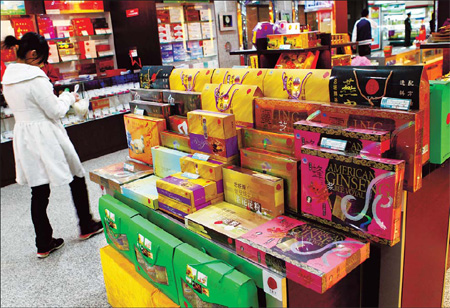Top Stories
New packaging rules unravel
By Wang Chao (China Daily)
Updated: 2010-04-14 08:26
 |
Large Medium Small |
|
 Despite a government ban on excessive packaging, such products are still seen at a local shop. [Wang Jing / China Daily] |
Upmarket tea shops among the worst offenders, say critics
Retailers are so wrapped up in the idea of presentation that they are ignoring "anti-over-packaging" rules introduced at the start of the month.
Critics say things are unlikely to change without punishments for stores and producers that continue to provide luxuriously packaged commodities in Beijing.
The phenomenon is especially apparent in tea shops.
"Yes, we have good packaging to go with the tea," said a seller surnamed Wang from Ten Fu's Tea in Wangfujing Street.
"We have well-packaged Pu'er tea. The tea is wrapped in plastic bags, then by silk and then it is put into a lacquer box. If we want it to be more fancy, we have plenty of packaging choices."
The exquisitely packaged tea sells for between 1,000 yuan and 3,000 yuan a box, said Wang.
Tea-lover Liu Yingdong said overpriced packaging hits drinkers in the pocketbook.
"Packaging makes up a big portion of the total cost if you buy tea products from tea stores," Liu said, claiming tea worth 300 yuan can be sold for 500 to 600 yuan if it is well wrapped.

On April 1, the General Administration of Quality Supervision, Inspection and Quarantine issued a State standard for commodity packaging. The effort was aimed at the sale of food and stipulated that packaging should not exceed three layers and that empty space inside the package should not be more than 60 percent. The new rules also said packaging should not account for more than 20 percent of the price of the product.
Asked about their attitude toward the new policy yesterday, workers at both Wuyutai and Ten Fu's tea shops, two of the biggest tea stores in China, said they had not yet received direction from their headquarters.
It's not just tea shops that seem to be ignoring the new rules.
"I shop for groceries every day and haven't seen any difference in the products I buy since the policy came out," said a customer surnamed Wen who was shopping in Jingkelong Supermarket.
"The plain-packaged products are still plain and the over-packaged ones are still over-packaged."
Dong Jinshi, secretary-general of the International Food Packaging Association, supports the new policy and says it has clear goals.
"The intention of the policy is good," Dong said. "It can bring down the cost of most food products and will create less trash because most of the packages are thrown away and become a burden on the environment."
Dong estimated that among the 80 million tons of household garbage produced each year nationwide, 30 percent of trash from homes was packaging. Dong estimated resources wasted on unnecessary packaging each year are worth up to 30 billion yuan.
However, critics say despite the policy's apparent good sense, the fact that it was not accompanied with punishments for rule breakers means it is having little impact.
Vivian Jiang, Wal-Mart's PR manager, told METRO the store prefers to sell products with minimal packaging but many suppliers still over-package.
Dong, from the International Food Packaging Association, admitted that it is currently impossible to make suppliers opt for simple packaging.
"We cannot force manufacturers and stores to implement this standard, since it is just a standard for reference," Dong said. "We need a regulation which will have legal standing. Now, all we can do is encourage them to be self-disciplined."
Dong said a hearing was held for the packaging regulation in 2008 but the final draft hasn't yet been approved by the State Council, so punishments are not yet an option.
Another barrier to getting rid of excessive packaging for products such as expensive tea is in the distinction between "food" and "gifts", added Dong.
"Packages of plain food rarely go beyond three layers; but for gifts, they easily exceed this standard; so if the tea stores argue that they are selling 'gifts', then we have nothing to say."







